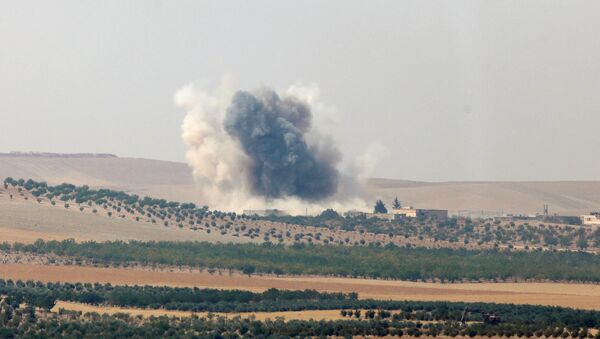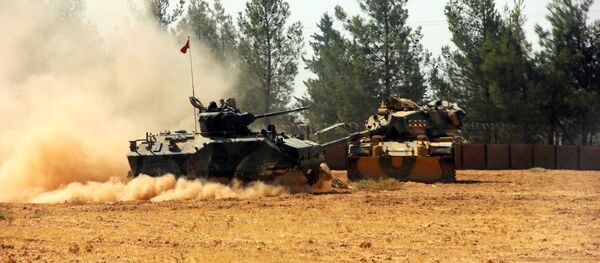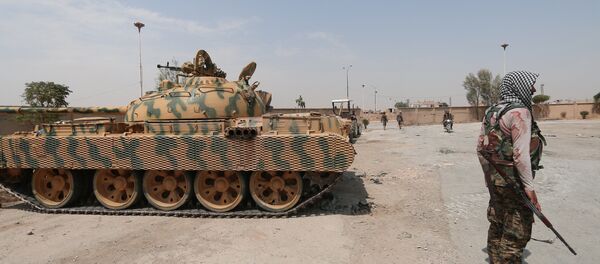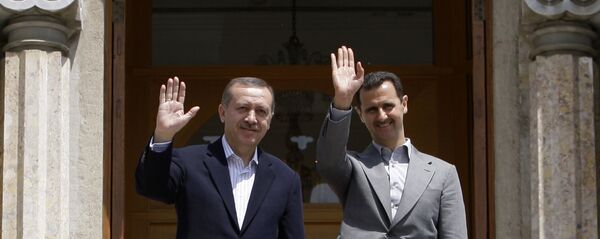On early Wednesday, Ankara announced that Turkish forces, backed by US-led coalition aircraft, had begun a military operation dubbed "Euphrates Shield" to clear the Syrian border town of Jarablus of Daesh terrorists.
However, later President Recep Tayyip Erdogan added that the ultimate goal of the operation is to neutralize the threat coming from both Daesh and Syrian Kurds.
Later on that day, a video was published, showing the situation in the combat zone.
On Tuesday, Turkish Prime Minister Binali Yildirim said that Ankara will prevent the establishment of a Kurdish state in northern Syria. He added that a Kurdish state would also be a threat to Syria’s territorial integrity.
Meanwhile, Kurdish forces are making advances in north-eastern Syria and are going to take control over the region. The Syrian government may soon lose control over the Hasakah province.
Erdogan’s words on fighting Kurds are vague but this is a typical Erdogan statement, Alexander Ignatenko, president of the Institute for Religious and Political Studies, said.
"This is Erdogan’s typical political behavior, like his recent words that Russia could use the Incirlik airbase. But actually this cannot happen because Ankara doesn’t own the base," the expert told the Russian online newspaper Vzglyad.
According to him, all parties involved in the Turkish offensive in Jarablus, particularly the United States, see the operation as aimed against Daesh.
"The Americans and the entire international coalition are either neutral or loyal towards Kurds. The US and Russia haven’t authorized an operation against Kurds," Ignatenko pointed out.
At the same time, he underscored, Turkish forces may have a Kurds-related goal in their operation.
"Probably, Erdogan wants to take Jarablus and liberate it from Daesh before Kurds take over the city. So, in fact, the operation is not anti-Kurdish. On the other hand, it is aimed against Kurds because Ankara doesn’t’ want to give Jarablus to Kurdish forces," the expert suggested.
Erman Cete, a specialist in Middle Eastern affairs, said that the operation in Jarablus is making the Kurdish problem even more complicated.
He also expressed hope that the operation in Jarablus may reboot the Kurdish settlement in Turkey in the short-run.
In turn, Syrian lawmaker Muhammad Kheir Al-Akkam harshly criticized the operation, saying that Turkey is violating international law.
"Despite its good intentions, Turkey should start coordinating its actions with the Syrian government. This is a blatant violation of international norms. They must coordinate their actions with Damascus for a legal military operation in Syria," the lawmaker stressed.
"These events could have prompted Turkey to change its role in the conflict and take measures," he said.
Turkey is embracing a more active role in the Syrian crisis, Stanislav Tarasov, head of the Middle East-Caucasus think-tank, told Vzglyad.
"Turkey is shelling Daesh terrorists. In addition, Ankara is trying to resolve the Kurdish problem. If Russian President Vladimir Putin visits Antalya Kurds will be on the agenda of his talks with Erdogan," the analyst said.
He also emphasized that Ankara is changing its stance towards the Syrian government.






